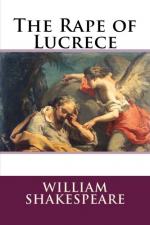|
This section contains 8,857 words (approx. 30 pages at 300 words per page) |

|
SOURCE: “Lucrece,” in Shakespeare's Sonnets and Narrative Poems, Longman, 2000, pp. 63-81.
In the following excerpt, Cousins argues that Tarquin and Lucrece can be seen as parodies of Petrarchan lovers and that Lucrece's husband, Collatine, is a braggart who unwittingly turns Tarquin's violent attention towards Lucrece.
(iii) Tarquin, Lucrece, and Collatine
As might be expected, much of the more recent commentary on Lucrece has focused on the interrelated matters of politics, gender and subjectivity. The poem's representation of the Roman world and its politics, especially its sexual/gender politics, has been studied; how Lucrece emerges from the variously political discourses of later Elizabethan society, and its negotiations with them, have been considered; the poem's representations of subjectivity in relation to patriarchy and to rape—and their connections—have been widely discussed.1 In focusing on those matters, most commentary has inevitably centred on the characterization of Lucrece herself. But as...
|
This section contains 8,857 words (approx. 30 pages at 300 words per page) |

|


